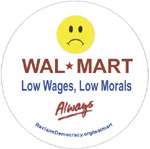By Phil Mattera
First published by Dirt Diggers Digest, Sept 23, 2010
In the mid-1990s business groups such as the American Trucking Association – then led by Thomas Donohue, currently head of the U.S. Chamber of Commerce – launched a crusade to ban union corporate campaigns. The effort fizzled out, but now Wal-Mart may be trying something similar to thwart site fights pursued by community groups opposed to the opening of the giant retailer’s stores and distribution centers.
The company is pouncing on a story published in the Wall Street Journal in June reporting that rival grocery chains such as Safeway and SuperValu helped to pay for the services of a firm called Saint Consulting Group, which has worked with community groups around the country in campaigns against Wal-Mart projects. The article also reported that Saint’s fees are sometimes paid by the United Food and Commercial Workers. The UFCW does not hide the fact that it works with community groups opposed to the virulently anti-union Wal-Mart, whose expansion threatens the jobs of UFCW members at unionized competitors. The UFCW confirmed to the Journal that it has funded Saint and insisted it had every right to do so. The newspaper said that the rival chains declined to comment.
In a just-published follow-up article , the Journal reports that Wal-Mart is asking courts to compel its opponents to disclose who is paying their legal bills in various environmental lawsuits challenging the company’s expansion. This could be the first step in an effort to get courts and perhaps friendly legislatures to put restrictions on site fights and their funding. While Wal-Mart claims to be most upset about the involvement of its competitors, the company may try to use this issue to weaken community groups and the UFCW, its long-time nemesis.
It is the height of hypocrisy for Wal-Mart to complain about collusion among its adversaries. The beast from Bentonville has never hesitated to use every trick at its disposal – including the funding of front groups – to advance its expansion efforts. Over the summer it succeeded in getting permission to build a second store in Chicago by using tactics such as creating fake community groups and hiring low-income people to pose as demonstrators supposedly eager to get a Wal-Mart job. The company also pretended to have seriously negotiated with unions on wage rates for the store.
Several years ago, Wal-Mart sought to defuse criticism of its detrimental impact on local businesses by launching an “Opportunity Zone” program that amounted to little more than bribing small firms to back its agenda. In 2006 it came to light that two blogs that appeared to be written by independent supporters of the company were actually created by Wal-Mart’s public relations firm, Edelman. That was in addition to reports that the company was cultivating real bloggers, some of whom were repeating company talking points verbatim.
The amount of money Wal-Mart’s competitors have contributed to site fights probably does not compare to what Wal-Mart has spent itself. Apart from the direct costs of those site battles, the company cultivates political support through direct means such as campaign contributions and is believed to make wide use of indirect means such as giving consulting contracts to relatives of public officials.
State and local governments end up paying for the company’s campaigning through the economic development subsidies (estimated at more than $1.2 billion) they give to Wal-Mart and the forms of tax avoidance (estimated at billions more) that the company arranges for itself.
Wal-Mart may feel that the likes of Safeway and Supervalu are violating some unspoken rule by supporting site fights, but it has broken every rule in the book itself in pursuit of endless expansion. But rather than defending those rivals, the most important thing is to be sure Wal-Mart does not exploit this issue to put shackles on community groups and unions, which are often the only forces working against the company’s quest to take over everything.
- See our huge collection of articles, studies, internal documents and more on Wal-Mart and big box stores.
- Visit our Merchandise Page to see anti-Walmart stickers, buttons, and more.
- Please help support this work – make a tax-deductible donation to ReclaimDemocracy.org today!
















